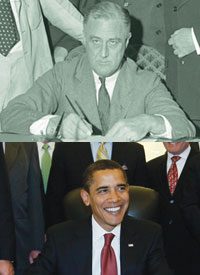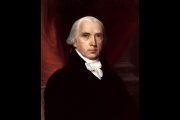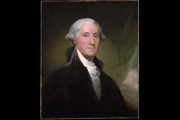
Gross primarily singles out those with "ideological" objections. "Amity Shlaes, George Will, and assorted libertarians cling bitterly to the notion that the New Deal didn't work, that FDR's policies of regulatory reform and sharply increased government spending were an abject failure, that the economy didn't turn around until the day Japanese bombers dropped their payloads on Pearl Harbor. They believe Keynesian-style stimulus didn't work in the 1930s, so it won't work now."
ITEM: The New York Times for January 12, in a article entitled, "In Emphasis on Economy, Obama Looks to History," reports of the incoming president: "His aides said Mr. Obama had studied the way Franklin D. Roosevelt approached the first 100 days of his presidency, and in particular had seized on the notion of Roosevelt having a 'conversation with the American public' to try to prepare it for a difficult time. He has, aides said, even looked at the words Roosevelt used and the tone he struck. Mr. Obama has sought to strike a balance: emphasizing the depth of the problem, to create a sense of political urgency for Congress to act quickly, while not being so pessimistic that he could further destabilize the jittery financial markets or deplete the sense of energy and hope accompanying his election."
CORRECTION: The theme of this script has already been written, and some of the rehearsals have already been held. Barack Hussein Obama is to play Franklin Delano Roosevelt in the New New Deal. George Bush gets to be Herbert Hoover. Obama himself has drawn the parallels on numerous occasions, which have been echoed repeatedly in the media — both favorably, by liberal supporters, and unfavorably, by those who dread the harm it could do to the country. Time magazine even Photoshopped Obama as Roosevelt on its cover, showing him clinching an FDR-style cigarette holder in his teeth in the jaunty attitude of the famous original.
To support the revival of the New Deal requires some very selective views of what it meant the first time around. In so doing, many of the leftists who dominate the mainstream media and much of academia have to bend the truth and rewrite the history.
The myth in a nutshell is that FDR was elected in 1932 after the free market failed in the United States. He quickly heartened the country with his speeches and brilliant, far-reaching New Deal policies that jump-started the economy — putting America back to work and ending the Great Depression.
That just isn't so. Even the Franklin D. Roosevelt Presidential Library and Museum acknowledges that "the effects of the Great Depression stubbornly held on into the early 1940s." Roosevelt was elected after berating Herbert Hoover for being the "greatest spender in history." The Republican administration, said FDR, had "piled bureau on bureau, commission on commission … at the expense of the taxpayer." Roosevelt the candidate was against big government and demanded an end to deficit spending. (The Roosevelt Myth, 1956 edition, John T. Flynn) Before he was elected, Roosevelt promised to reduce the budget by 25 percent and seek a balanced budget.
In office, however, crackpot ideas became federal policy. Cartel codes were created: businesses were told to keep prices and wages high and also to reduce output. Farmers were targeted as well. As summarized by Chris Edwards of the Cato Institute in 2005: "The Agricultural Adjustment Act of 1933 similarly restricted production to keep prices high. 'Excess' output was destroyed or dumped abroad. While millions of Americans were going hungry, the government plowed under 10 million acres of crops, slaughtered 6 million pigs, and left fruit to rot. Production of milk, fruits, and other products was cartelized to boost prices under 'marketing orders' begun in 1937."
By the time Roosevelt was running for his second term, federal spending had doubled. In 1937, the stock market crashed again, part of the depression within the Great Depression. Between September 15 and December 15, 1937, notes Amity Shlaes, "the jobs started to disappear, with employment moving back to 1931 levels."
Henry Morgenthau, who served as Roosevelt's treasury secretary, admitted to a congressional committee in May 1939 (as quoted in the recent book New Deal or Raw Deal? by Burton Folsom, Jr.): "We are spending more money than we have ever spent before and it does not work…. We have never made good on our promises…. I say after eight years of this Administration we have just as much unemployment as when we started … and an enormous debt to boot."
Hoover's policies before Roosevelt took over were akin to a mini-New Deal, but that hasn't prevented Democrat statists over the decades from maligning his administration's supposed free-market failures as the cause of the Depression, a trend that the Democrats have already warmed up to use against the Bush administration when the Obama solutions don't work. FDR's economic adviser Rexford Tugwell admitted in 1974 that the New Deal amounted to repackaging Hoover's interventionist initiatives, saying "practically the whole New Deal was extrapolated from programs Hoover started."
But the interventions made things worse. Five years into Roosevelt's New Deal the unemployment rate stood at 20 percent. In 1940, private employment in the United States was lower than it had been in 1929, despite or because of the policies of Hoover and Roosevelt. "From 1929 to 1940, from Hoover to Roosevelt, government intervention helped to make the Depression Great," writes Amity Shlaes in The Forgotten Man (2007). At the beginning of the depression, she notes, the private sector ruled; by the start of World War II, "it was the public sector that was dominant."
Federal government outlays went from $4.5 billion in 1933 to $9.4 billion in 1940 – more than doubling. Yet chronic unemployment persisted. This should be no surprise, since it became a crime, for example, to cut prices or increase output, according to the National Recovery Industry Act. Jim Powell, author of FDR's Folly, detailed how blacks and poor Americans, among others, suffered at the hands of the Roosevelt administration's policies.
As Powell wrote in 2003:
Marginal workers, like unskilled blacks, desperately needed an expanding economy to create more jobs. Yet New Deal policies made it harder for employers to hire people. FDR tripled federal taxes between 1933 and 1940. Social Security excise taxes on payrolls discouraged employers from hiring. New Deal securities laws made it harder for employers to raise capital. New Deal antitrust lawsuits harassed some 150 employers and whole industries. Whatever the merits of such policies might have been, it was bizarre to disrupt private sector employment when the median unemployment rate was 17 percent.
The Agricultural Adjustment Act (1933) aimed to help farmers by cutting farm production and forcing up food prices. Less production meant less work for thousands of poor black sharecroppers. In addition, blacks were among the 100 million consumers forced to pay higher food prices because of the AAA.
Class warfare was certainly part of the arsenal of Roosevelt, who railed against "economic royalists" and berated the evil rich with other epithets as well. So it is with Obama. Before he was elected, Obama told interviewer Charlie Gibson that he would raise taxes on capital gains even if it meant that revenues were reduced. The goal is to take the money from the "rich."
While Obama talks about fixing "infrastructure" with public money, FDR also did just that in spades — starting with a federal leaf-raking agency named the Civil Works Administration headed by Harry Hopkins, which morphed into the Works Progress Administration. Said Hopkins: "I've got four million at work, but for God's sake, don't ask me what they are doing."
FDR used a crisis situation to accrue power to himself and his supporters. In his first Inaugural, Roosevelt insisted, "We must move as a trained and loyal army willing to sacrifice for the good of a common discipline." Should Congress not heed his wishes, said FDR, he would seek "broad executive power to wage a war against the emergency as great as the power that would be given me if we were in fact invaded by a common foe." During his second Inaugural, he was still looking for more authority — saying he sought "an instrument of unimagined power for establishment of a morally better world." Even if one is willing to grant that good intentions were the motive, that's a harrowing statement in a free country.
However, keep in mind that demagogues see opportunity for themselves when adversity strikes others. As Obama's right-hand man Rahm Emanuel told the Wall Street Journal, "You never want a serious crisis to go to waste."
Roosevelt helped lay the groundwork for power grabs to follow. As Robert Higgs lamented in The Freeman in 1998: "Once the New Deal had burst the dam between 1933 and 1938, ample precedent had been set for virtually any government program that could gain sufficient political support in Congress. Limited constitutional government, especially after the Supreme Court revolution that began in 1937, became little more than an object of nostalgia."
Accordingly, the New New Deal could be even worse than the old one. Analysts are already wondering whether the first deficit under Obama — who formerly denigrated deficit spending and promised fiscal discipline — will be $1 trillion or $1.5 trillion. Paul Rubin, a professor of economics and law at Emory University, pointed out in the Wall Street Journal last fall:
Unlike FDR, Mr. Obama will not have to create the mechanisms government uses to interfere with the economy before imposing his policies. FDR had to get the Supreme Court to overturn a century's worth of precedents limiting the power of government before he could use the Constitution's commerce clause, among other things, to increase government control of the economy. Mr. Obama will have no such problem.
FDR also had to create agencies to implement regulations. Today, the Securities and Exchange Commission and the National Labor Relations Board (both created in the 1930s) as well as the Environmental Protection Agency and others created later are in place. Increasing their power will be easier than creating them from scratch.
Even before the current crisis, there was a great demand for increased government regulation to limit global warming. That gives the next president a ready-made box in which to place more regulation, and a legion of supporters eager for it.
If the new president gets even a portion of what he is hunting for as he models himself after Franklin Roosevelt, the only people singing "Happy Days Are Here Again" will be left-wing partisans with faulty memories. Or masochists.
Photo: AP Images



